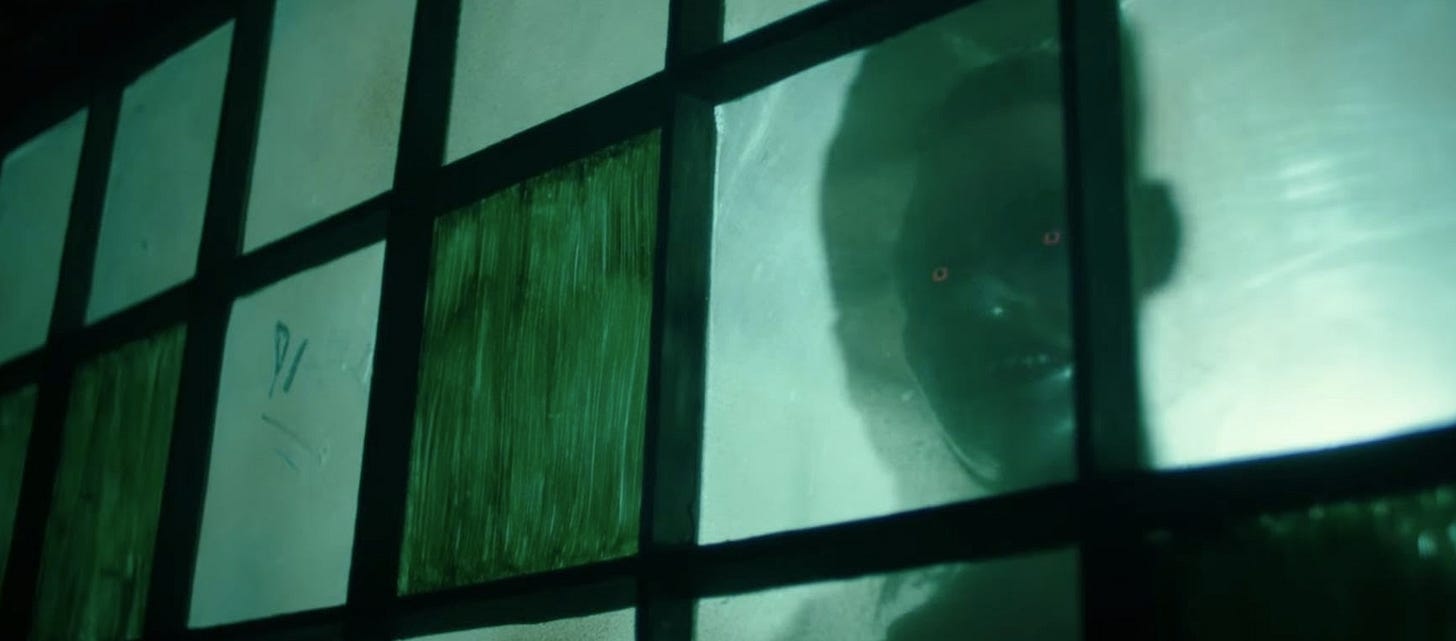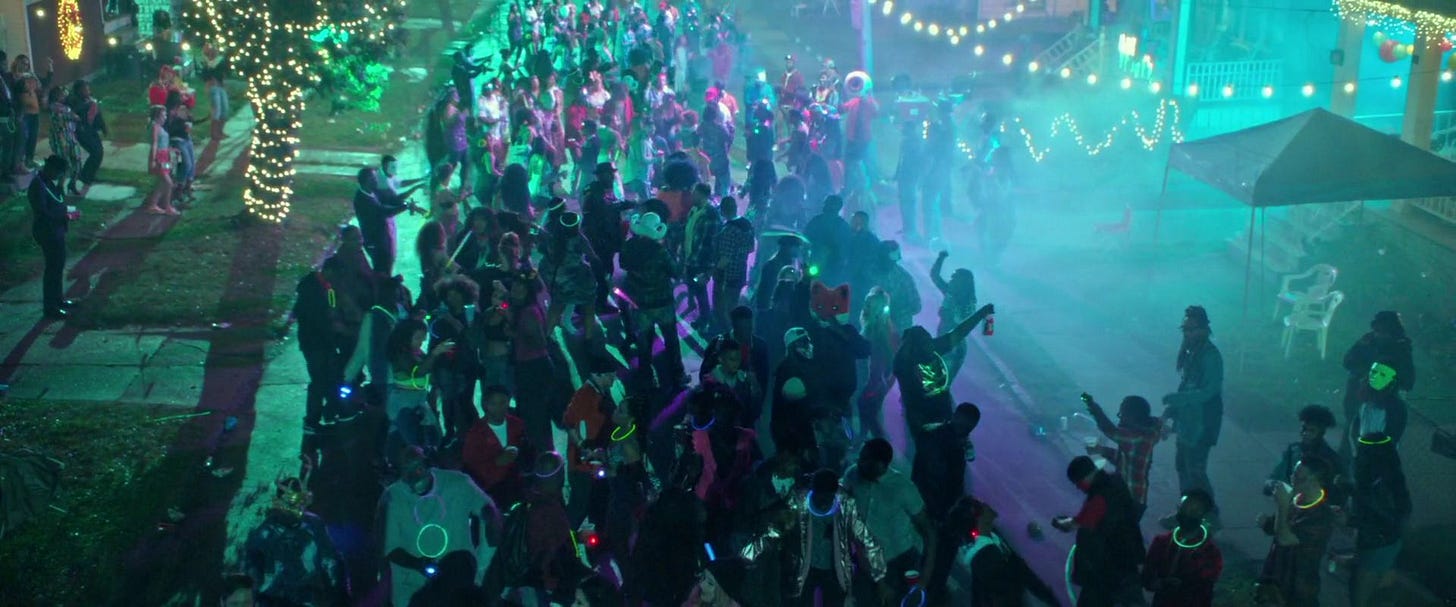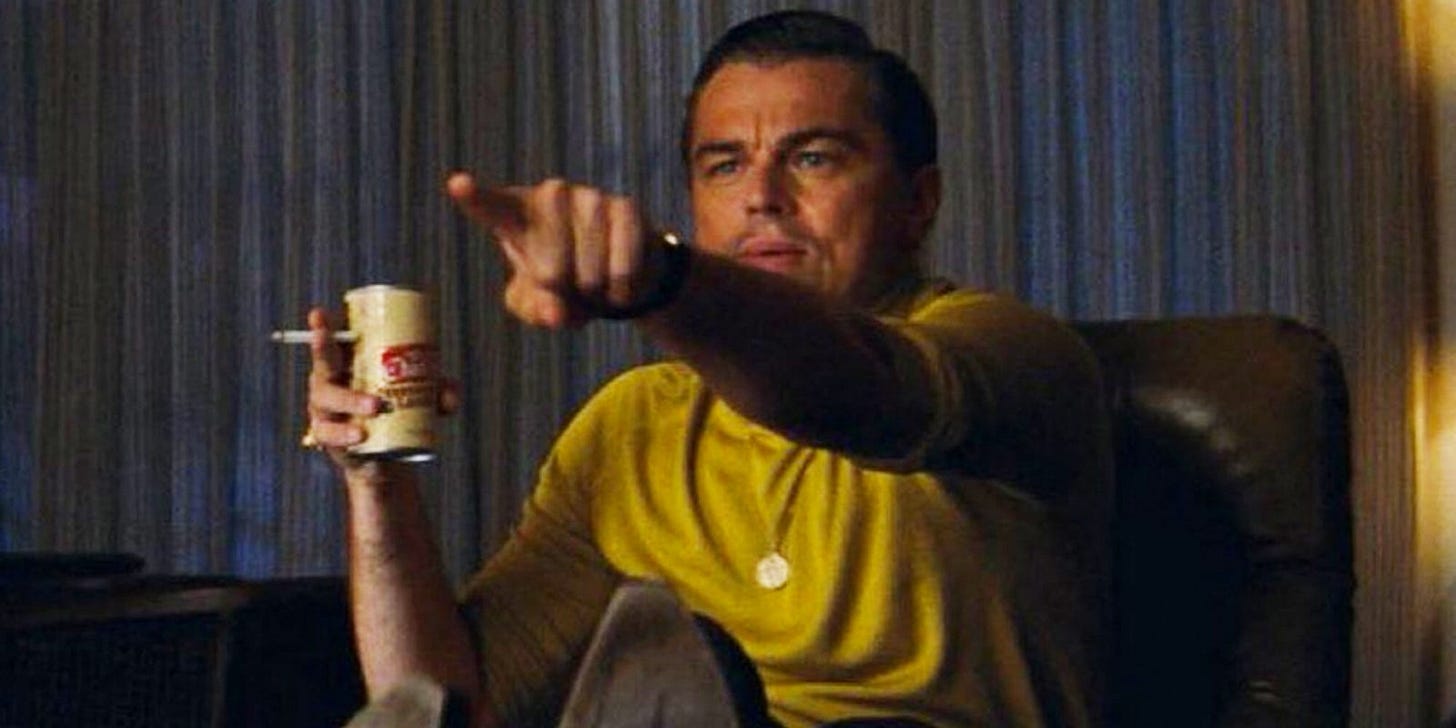WIHFL: The First Purge, which is actually the fourth Purge
What I'm having fun with lately, 10/11/2024
Aaand we’r eback. Check out my reviews for Purges 1, 2 & 3
The First Purge haunts me.
Not in the way that a horror movie should haunt me, not in the way I want to be haunted. No, it vexes me because just as I had settled into the rhythm of what these movies are like, this one shook me out of my malaise. It’s not good, but it is almost good, in a way that forces the shortcomings of this series into plain view. And maybe that makes it the perfect prequel: it lays the foundations, cracks and all.
The First Purge opens on a screening interview for an as yet unnamed social experiment. (The interviewer hits us with a “purge… I like the sound of that,” so we know exactly where we’re going.) Marisa Tomei1 plays Dr. Updale, a scientist who theorizes that controlled decriminalization of actual murder may curb violence for the rest of the year, a desperate ploy driven by skyrocketing crime and a second housing crisis. The newly elected New Founding Fathers of America are backing her experiment by offering up a stretch of Staten Island as a testing ground, and paying people $5,000 to stay overnight plus more to go “participate.” Updale doesn’t see the problem with any of this. She will later deliver a sickened What have I done? upon realizing that the state incentivizing murder is, in practice, bad.
This comes as less of a surprise to those protesting the NFFA’s encroachment into their community. Race has always been winked at in the subtext of these movies, but new-to-the-series director Gerard McMurray makes it supertext. Activist leader Nya (Lex Scott Davis) stands atop a beat up sedan and says into a megaphone, “This is another way to keep brown and Black people down.” The main cast is entirely Black, and are mostly given distinct pasts, goals, and things to do. Even, dare I say it, good dialogue! It inherits many problems with representation from the series as a whole,2 but compared to Election Year’s crip whistle scene, this feels like an improvement. Maybe that’s too low a bar.
If the last two movies formed the Good At Purge cycle—where some people are just extraordinarily good at the Purge—here begins the Bad At Purge cycle. Folks are breaking into ATMs, and putting firecrackers into teddy bears, and getting busy in the streets. It feels like the film is retroactively addressing everything people would actually get up to #ifthepurgewashappeninginreallife.
To some extent this is the worst of both worlds: less of the minute-by-minute bullshit that made the other Purges so entertaining, while also making it more confusing when someone did just have a mask made of human teeth prepped for the occasion. I was nevertheless hopeful that this meant, maybe, we’d be getting some Real Social Commentary.
Then the slaughter starts, and it’s revealed that the killers are Russian mercenaries, blah blah, and we end on a pretty great Die Hard-esque finale. Classic Purge nonsense. But after starting off in such a promising direction, it felt like a punt.
I walked away tremendously unsatisfied. It was a different movie that clarified my feelings about The First Purge, and the series as a whole: Gerard McMurray’s Burning Sands, released the previous year.
Burning Sands follows a pledge class at a prestigious Black fraternity during Hell Week. It demonstrates the lengths to which someone might go to carve out a place in the world. More than that, the film explores hazing culture. It’s a plea to acknowledge the torture undergone by pledges since hazing was forced underground, an argument that one person’s suffering doesn’t mean everyone else should suffer, too.
In the craft of Burning Sands, you see some critiques that resurface in The First Purge—flubbed takes, a general lack of focus—but the drama is advanced by real opinions and specific experiences. It’s a good movie.
Blumhouse tapped McMurray to take over the Purge franchise after watching Burning Sands. In that movie, he used his own experience pledging at Howard University as inspiration, and wanted to see that system changed. For The First Purge, he wanted to explore what the Purge would be like for Black folk, and was inspired by his experience surviving Hurricane Katrina.
In this context, I just can’t help but revisit the original inspiration for The Purge. James DeMonaco and his wife had a close call with a drunk driver. Exasperated, they mused to one another about a world where everyone gets one free murder per year.
Whatever works about the Purge series, I think, stems from this. Horror is built on macabre thoughts that we don’t say out loud, the latent fear of those around us. But winding it all into a commentary on class warfare and state violence? It just seems like an afterthought.
First of all, the reveal that roving hate groups are actually dispassionate foreign mercenaries doesn’t sit right with me. Hate stems from a far more insidious, and more terrifying, counterculture. It’s too easy to direct fear outward, rather than inward; the call is coming from inside the house. And while I guess you could argue that the mercenaries are a metaphor for state-sanctioned violence from our legal system, the movies never commit to this point. Leo Barnes is a cop.
Second, and more patently, the Purge is a reactionary franchise. The First Purge stumbles through some embarrassing references to Trump drama, and it’s awash with empty hate symbols.
When the Purge experiment suddenly turns bloody, Dr. Updale notices that the most prolific Purgers are all wearing masks. Why? They will face no legal repercussions, after all. The answer, left blessedly understated, is that NFFA instigators are disguising themselves as citizens to sow fear. It’s a neat origin story for the series’ ongoing fascination with creepy masks, even tying it to the persistent theme of astroturfing. But it’s also emblematic of The First Purge’s biggest problem: it’s full of interesting answers to fundamentally uninteresting questions.
Under DeMonaco’s hazy direction, it’s easy to get lost in the hilarity of increasingly bizarre Purgestuff. It’s where these movies shine. In the hands of a director that actually has something to say, the illusion dissipates. Maybe the Purge just isn’t a good allegory for what ails us.
Next up is The Forever Purge, another guest-directed entry, and the movie whose poster is what set me off on this journey in the first place. I’m a little bit burdened by my thoughts about The First Purge, but I’ll go in with an open mind. The sun is cresting the skyline. Purge Night is almost over.
What else I’m having fun with lately
Dandadan. I’ve been super interested in this manga for a while now—about a spirit medium who doesn’t believe in aliens and a sci-fi dork who doesn’t believe in ghosts (both are wrong)—but because I am weak of spirit I didn’t start on it until the anime came out. And it is gooood y’all. My only recommendation is to go into with the mindset that this is supernatural horror, not generic shounen-adjacent stuff. Also the OP slaps, but you already knew that.
Arcade Paradise. What I’ve actually been playing this week is Lake, a chill 2021 game about being a mail carrier. But that game is sort of difficult to recommend. Instead, you should play this other game about working a regular job, only the job is an arcade and you get to play all the games.
Odie Leigh again. I think I listed her in my last WIHFL, but after going to her concert I’m ashamed I didn’t give her a full spot. People are surprised when I tell them I like country. This is what I mean when I say that.
Thanks for reading!
DR
Tomei is certainly not the main character, but she is this movie’s allotted “holy shit Marisa Tomei is in this???” charcter.
Specifically, the film does a poor job of representing minoritized characters who succeed within the system. Dmitri (Y’lan Noel) absolutely steals the show, and is wealthy, capable, and well-connected. He’s also a drug kingpin, and his success is meant to pose a moral question. On the other hand, this is also the first time we see a Black NFFA member, so McMurray’s already being far more intentional than DeMonaco ever was.







Every time you post a purge review, I learn that more purge movies exist
you won't be recommending arcade paradise when you try to beat line terror.